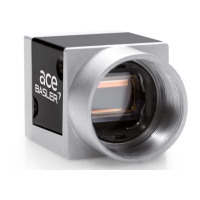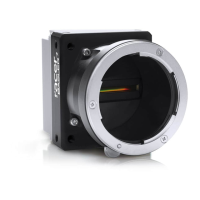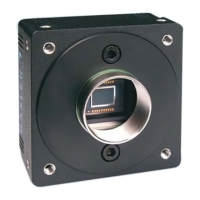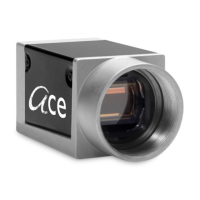AW00097603000 Standard Features
Basler aviator GigE 201
Operating the Sequencer Using Basler pylon
You can use the pylon API to set the parameters for operating the sequencer in Auto sequence
advance mode from within your application software.
The following code snippet illustrates enabling the sequencer and disabling the sequencer. The
example assumes that sequence sets were previously configured and are currently available in the
camera’s memory.
// Enable the sequencer feature
Camera.SequenceEnable.SetValue( true );
// Disable the sequencer feature
Camera.SequenceEnable.SetValue( false );
You can also use the Basler pylon Viewer application to easily set the parameters.
10.10.1.2 Configuration
Configuring Sequence Sets and Advance Control
Use the following procedure for populating sequence sets and making the related settings:
1. Make sure that the sequencer feature is disabled.
2. Set the Sequence Advance Mode parameter to Auto.
3. Set the Sequence Set Total Number parameter. The maximum number is 64.
4. Select a sequence set index number by setting the Sequence Set Index parameter. The
available numbers range from 0 to 63.
When configuring sequence sets make sure to always use a continuous series of index
numbers starting with index number 0 and ending with the Sequence Set Total Number
parameter value minus one. For example, specifying a series of sequence sets only with index
numbers 5, 6, and 8 is not allowed. If you did nonetheless, the not explicitly configured
sequence sets would, within the scope of the sequence set total number, be populated by
default parameter values.
5. Set up your first acquisition scenario (i.e., lighting, object positioning, etc.)
6. Adjust the camera parameters to get the best image quality with this scenario (you are
adjusting all parameters in the active set).
7. Set the Sequence Set Executions parameter. The available numbers range from 1 to 256.
8. Execute the Sequence Set Store command to copy the sequence parameter values currently
in the active set into the selected sequence set. Any already existing parameter values in the
sequence set will be overwritten.
9. Repeat the above steps starting from step 4 for the other sequence sets.
